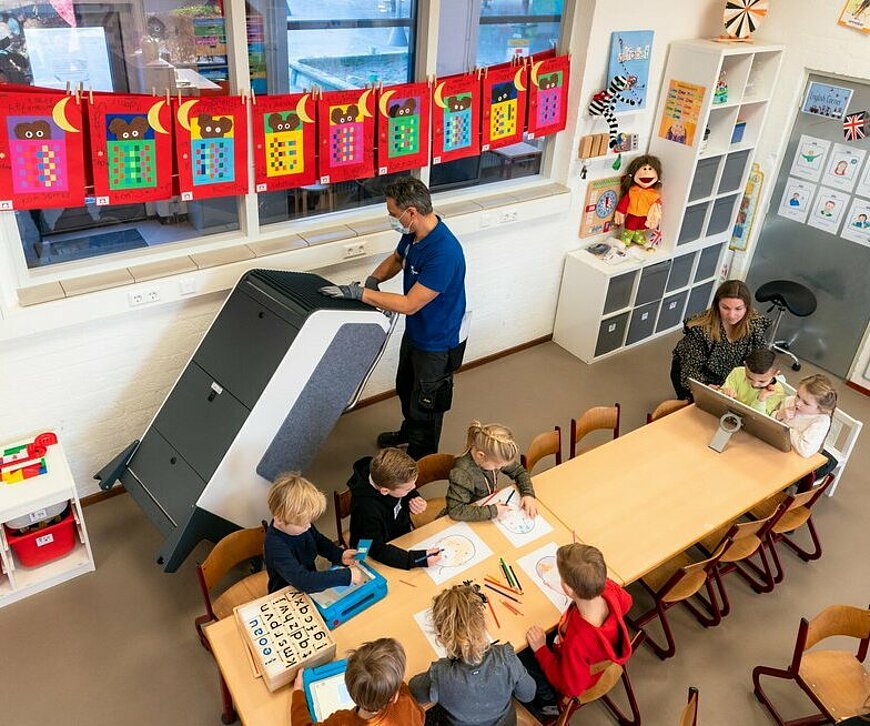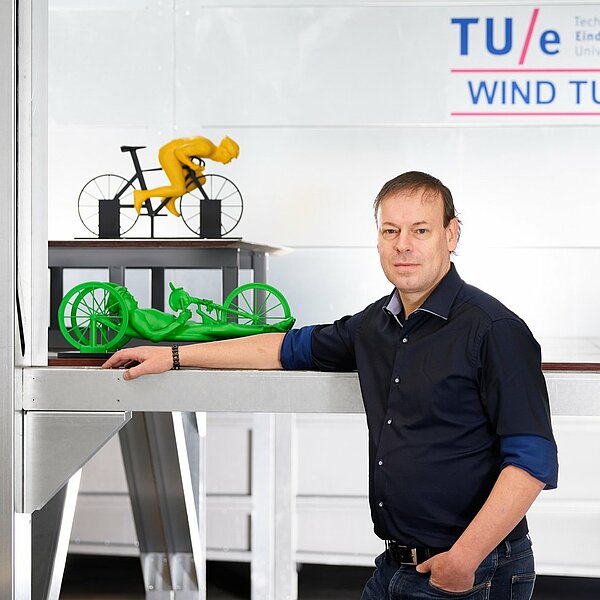Corona research TU Eindhoven on air purification in schools kicks off in the Netherlands

Can air cleaners in classrooms contain corona infections? That is the question that Bert Blocken, professor of building physics at TU Eindhoven, virologist Marc Van Ranst from KU Leuven and Leen Peeters from consultancy Th!nk-E want to answer in a large-scale study in 100 schools spread across the Netherlands and Belgium. With the help of more than ten manufacturers, the scientists will place air purification devices in about 500 classrooms and track corona contamination among students. In the Netherlands, the first purifier was installed on Friday.
© Foto: Paul Raats
With this study, Blocken, Van Ranst and Peeters want to clarify to what extent small saliva droplets, so-called aerosols, can be purified from the air and whether there is a relationship between air purification and the spread of the coronavirus in schools. As far as we know, no similar research of this magnitude has been carried out in schools before, says Blocken: "This will allow us to potentially prevent school closures in the future."
The researchers intend to place air purifiers in five classrooms per school. The idea is for the school administration to monitor the number of corona infections in these five rooms - as well as in five classrooms without air cleaners - until the coming summer.
At the same time, the researchers measure whether the amount of virus particles in the air decreases with special measuring equipment. This equipment consists of sensors that measure the concentration of CO2, the amount of aerosols, the temperature, the humidity, the sound volume and the virus load in the air. For the children themselves, nothing changes; they will be taught in the same way.
Overwhelming response
Elementary schools can participate in the project free of charge. So far the enthusiasm has been overwhelming. In Belgium, registration is no longer possible. There, air cleaners are currently being installed in abundance. The Netherlands is also nearing the limit in terms of the number of participating educational institutions. On Friday, the first installation was installed in our country, in Kindcentrum De Kiezel in Best.
The principal of De Kiezel hopes that air purification will contribute to keeping the schools open. "I heard about the research via a parent and thought: this way we can contribute to keeping schools open. It costs us no money or extra effort because we already keep track of how many children are absent because of corona", says Marjolein van Lieshout of De Kiezel.

Follow-up
This project is a follow-up to earlier research by Blocken and his research team at TU Eindhoven into the spread of aerosols in indoor sports facilities and stadiums, among other places. One of their conclusions: a combination of ventilation and air purification is a good precautionary measure - ventilation alone does not remove aerosols sufficiently.
Blocken: "Unless there is enough ventilation capacity, but that means that large quantities of cold outside air have to be constantly reheated. That's irresponsible with current energy prices and in the context of climate change."
© Foto: Bart van Overbeeke
Strict conditions
In countries like Germany, South Korea and Australia, air cleaners are already in full use. So Blocken wants to investigate whether air cleaning can be a remedy for Dutch and Belgian lockdowns. "In 2020, we were leading the way on this topic for a while, then it slipped away and we were overtaken by other countries."
He emphasizes that he has no business interest. Manufacturers who meet strict conditions, such as testing by an independent body, may make their products available free of charge. The schools are not obliged to purchase these installations after the study.
Blocken: "I don't think we can fight the corona crisis only by focussing on behavior. On the contrary, I believe that technological solutions can also contribute to combating the pandemic." When Blocken, Peeters and Van Ranst will be able to submit final results of the study is not yet known. That depends on the peer review process, the academic review of the project.
The following companies are providing air cleaners free of charge for the duration of the project: Euromate, Allora Factory, Philips, Signify, Ergopolis Distribution, Dehaco, Trox and Deltrian. Vaisala and ABB will also provide additional equipment.